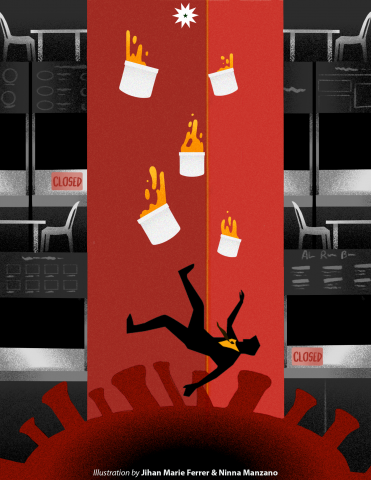“Nakakaiyak ‘to, pero buhay namin kayo. Kung wala kayo, wala na rin talaga kami.”
(The situation is distressing, but the students are our lifeblood. Without the students, we’re really left with nothing.)
This was the emotional response of Orange & Spices owner Harry Ong as he described to The LaSallian the grave reality of small businesses in DLSU’s vicinity four months into the community quarantine in Metro Manila.
All throughout Taft Ave., familiar shops and restaurants have already shut their doors as their halls—once vibrant with customers—lie empty with loyal patronage all but dried up. A cornerstone of DLSU culture is now finding itself at the end of the rope.
No easy way out
Business has truly seen better days. For Ong, the years 2011 to 2016 were the heydays, not only of his store, but also of fellow establishments in Taft, driven by strong demand from Lasallians.
But recent years have been tough. The lean years after the education system’s shift to K-12 slashed their once enormous customer base. “For almost two years, we [have been] operating at a loss,” he says. The Orange & Spices proprietor had hoped 2020 would be a year of recovery. Instead, it turned out to be the final nail in the coffin.
Over the past few months, more and more businesses have been forced to make their exit. Internet café Speedbytes was one of them. Ong revealed the shop’s closure last June 9 on Facebook. The business has operated for more than 16 years under Horace Lehaney.
“Hindi ko makalimutan umiiyak ako. Si [Horace] lumuluha na din. Sabi ko, ‘You should close [the shop]; it’s time for you to rest’…Ang sabi nga niya, nalulungkot siya kasi wala—wala siyang magawa,” narrates Ong.
(I cannot forget that I was crying. Horace was also in tears, and I advised him, “You should close [the shop]; it’s time for you to rest.” He was disheartened because there was nothing he could do.)
Things are no better in nearby One Archer’s Place. Jeff Yeh, who owned Seasons Hot Pot and Dimsum on the second floor of the condominium, shares that many businesses in the building were already forced to close. Even during the pandemic, the building’s administration continued to charge them more than P13,000 in monthly dues, he reveals.
Yeh shares that closing down his restaurant was the only choice left, with customers scarce since December. “Financially, it’s a disaster, no easy way to put it…It’s just a tough pill to swallow if we pull out,” he discloses.

Prospects uneasy
While efforts for recovery are underway, economic predictions remain dire. The International Monetary Fund expects the country’s economy to shrink by 3.6 percent this year. The only time that the country had performed worse was in 1984 and 1985, when the country logged negative 7.3 percent growth for both years.
Micro, Small, and Medium Enterprises (MSME) have been seriously impacted by the downturn. Although both Ong and Yeh acknowledge receiving support from the government, they both argue that the amount is simply not enough.
The Department of Labor and Employment provided cash subsidies to MSME employees worth between P5,000 to P8,000 per person, which labor groups criticized as being insufficient to cover living expenses. The cash aid also remains out of reach for many MSME employees who are neither Social Security System nor PhilHealth members.
Keeping Taft alive
The chances of an empty Taft are frighteningly likely. “Baka pagbalik niyo wala na si Orange [& Spices], wala na si Jus & Jerry’s, pagbalik niyo wala na si ganito ganyan,” predicts Ong.
(When you come back, Orange & Spices may be gone, Jus & Jerry’s, and this and that may no longer be there.)
Shifting to online selling is still difficult, with businesses forced to compete for limited customers. Ong relays, “Ang masaklap pa diyan, how can we pivot [online] kasi hindi naman kami kilala within Metro Manila…Marami kaming kalaban.”
(The difficult part is [figuring out] how we can pivot online when we are not that known within Metro Manila. We have a lot of competitors.)
Customers are also discouraged by the high prices charged by delivery services like Grab Express, while other Taft-based restaurants like Dixie’s and Eric’s Siomai and Sisig cannot afford mobile delivery services.
“Other delivery apps take as much as 30 percent of the sales of [these] establishments, hindering them [from making] enough profit to break even. They also take 20 percent of the riders’ delivery fee,” reveals Euson Go (IV, CIV-TRE) to The LaSallian.
Last June 29, Go launched The Taft Initiative, with a stated aim of raising support for businesses near DLSU. For him, the prospect that the University’s vicinity will be left with nothing is unacceptable.
One of the crucial objectives of the project, Go shares, is to lower delivery prices for customers through the initiative’s Project Taft Express.
By employing volunteer drivers to accomplish deliveries, establishments can maximize revenue, while a preorder system is envisioned to help stabilize customer demand. At best, Go hopes that the system will be able to offer reliable support for its partner restaurants with the pandemic situation continuing to drag on.
Ong and other business owners are relying on Lasallians to rally behind them.
“Tulungan natin itong mga ‘to [businesses], para at least ‘yung mga [future] generations na magiging Lasallians, makita pa kami. Kasi baka mamaya maging urban legend na lang kami pagdating ng araw.”
(Let us help these businesses, so that future generations of Lasallians could still see us. Otherwise, we may one day become nothing more than urban legends.)
As The Taft Initiative builds momentum online, Go appeals to the Lasallian community to help save a cornerstone of DLSU culture as “more and more establishments” consider permanent closure.
“I don’t want us to come back to Taft with nothing but vacant lots left all around,” he laments.

One reply on “Saving Taft: DLSU’s neighbor establishments on their last legs”
Its the same scenario sa UPLB.